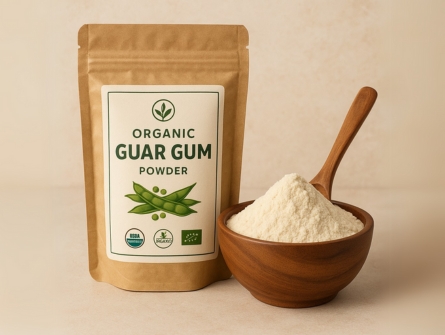Organic guar gum is a natural polysaccharide extracted from guar beans. Known for its excellent thickening and stabilizing qualities, it's used across industries like food, cosmetics, pharmaceuticals and oil drilling. In its powder form- organic guar gum powder -it’s more versatile and easier to incorporate in production processes.
Rising Demand for Organic Guar Gum Powder in Global Industries
The demand for organic guar gum powder has significantly increased over the past decade. The rise can be attributed to heightened consumer awareness and regulatory support for naturally derived additives.
Key Demand Drivers:
- Food Industry: Common in gluten-free formulations, dairy products and ready-to-eat meals for its stabilizing effect.
- Pharmaceuticals: Used in laxatives, capsules and drug delivery systems.
- Cosmetics: Preferred for its skin-friendly thickening capability in lotions and serums.
Organic Guar Gum Powder and Its Global Market Relevance
Organic guar gum, extracted from the guar plant, plays a vital role in multiple industries. As more companies transition to clean-label formulations organic guar gum powder has become an essential ingredient due to its natural thickening, emulsifying and stabilizing properties.
Industries such as food and beverages, pharmaceuticals, personal care and even industrial applications like mining and oil drilling use guar gum in large quantities. What sets organic guar gum apart is the absence of synthetic additives during cultivation and processing-making it appealing for clean ingredient formulations.
This shift in global preferences is reshaping demand and creating a more dynamic trade landscape involving both traditional producers and new market entrants.
Global Demand for Organic Guar Gum Powder Across Key Markets
The demand for organic guar gum powder is largely driven by consumer-facing industries that require functional, yet clean, ingredients. Countries in North America, Europe and parts of Asia are experiencing steady growth in consumption. These regions are not only home to well-established food and pharmaceutical markets but also prioritize natural product adoption.
Key Demand Regions:
- United States: One of the largest importers of organic guar gum, especially for food and pharma applications. The preference for chemical-free additives in processed goods and health supplements is fueling growth.
- Germany and France: Among Europe's leading markets for organic and functional food ingredients. The EU's strict food additive regulations encourage adoption of organically certified thickeners like guar gum E412.

- Japan and South Korea: High demand in food processing and cosmetics, where texture, clarity and purity are crucial. Organic guar gum is valued for enhancing product consistency.
- Canada and Australia: Moderate but growing demand in wellness and food sectors. Organic certification plays a big role in product positioning.
- China: An emerging market where demand is rising in both domestic food industries and exports that require certified ingredients.
While these countries may have domestic sourcing for conventional thickeners, the preference for certified organic raw materials makes them reliant on imports, especially from established guar gum powder supplier.
Global Supply Dynamics: Where Does Organic Guar Gum Come From?
Despite widespread usage, the production of organic guar gum is limited to a few countries due to climatic suitability, agricultural knowledge and processing infrastructure. India is the undisputed leader in both conventional and organic guar gum exports. The country's dominance is rooted in ideal agro-climatic conditions and deep-rooted expertise in guar cultivation and processing.
Major Supplier Countries:
- India: The global leader in guar gum production and export. India’s extensive guar cultivation areas and processing units allow it to meet global standards, including organic certifications. Nearly all leading guar gum powder manufacturers and exporters are based here.
- United States: Has limited domestic guar bean production. A few regions cultivate guar but not at a commercial level sufficient for widespread organic exports. The U.S. mainly imports organic guar gum powder from India for processing and use in high-quality goods.

- China: An emerging producer and exporter, though still reliant on imports for high-purity organic formulations. Local production is mostly focused on internal needs.
- Argentina and Brazil: South America shows potential, with small-scale farming and processing units exploring guar as a rotation crop. The region may become a niche exporter if organic processing infrastructure is developed further.
Export-Import Dynamics: Role of Guar Gum Powder Suppliers and Manufacturers
Guar gum powder suppliers and manufacturers play a crucial role in balancing global availability. Since organic variants are subject to stricter regulatory checks, only a limited number of suppliers operate at certified organic levels. This creates a supply bottleneck when demand surges.
Importing countries rely on long-term agreements with major producers to maintain consistent quality and volume. Many buyers in Europe and North America prefer suppliers that hold international certifications like USDA Organic or EU Organic.
The reputation of Indian guar gum powder manufacturers gives them a strategic edge. Some top exporters even offer custom formulation and blending services, allowing end-users to reduce processing costs
Trade Challenges Affecting the Organic Guar Gum Market
Several factors influence the trade of organic guar gum powder globally. Climatic fluctuations can affect guar crop yields, especially in monsoon-dependent regions. Since only a fraction of total production is certified organic, any disruption causes a noticeable impact on supply.
Furthermore, export regulations, import tariffs and international certification standards vary by country. These regulatory layers can delay shipments or restrict market access for new entrants.
Price volatility is another concern. As organic guar gum fetches a premium, fluctuations in raw material prices or currency values can affect margins for both exporters and buyers. Yet, despite these hurdles, the demand remains strong and continues to grow across key sectors.
Conclusion: A Growing Market with Strategic Importance
The global landscape for organic guar gum is dynamic, with increasing demand across major consumer markets and concentrated supply from key producing nations. Countries like the U.S., Germany and Japan are leading in imports, while India remains the dominant exporter with a mature manufacturing base.
As industries look for reliable natural ingredients, guar gum E412 in organic form is well-positioned to meet both functional and regulatory requirements. Its role will likely grow, supported by expanding applications and premium positioning in the food, pharmaceutical and personal care sectors.
FAQs
Web Design & Digital Marketing by Opal Infotech


